Jul
26
2011

Hebrews 11:1-16 | Sermon Notes 24 July 2011
“Now faith is the substance of things hoped for, the evidence of things not seen.” (Hebrews 11:1)
Introduction
Movies and TV teach our children a lot about faith. “It doesn’t matter in what or in whom you have faith, even if it’s in yourself, just as long as you have faith.”
Modern Christians go one step further and tell us to have faith, to trust in Jesus to save us. That’s a big step in the right direction, and a saving one, but it doesn’t give us much practical help in the day-to-day trials and temptations of life. The reason for this is because moderns do not understand biblical Covenants.
Continue reading
2 comments | tags: Abraham, Covenant Theology, Faith, Hebrews | posted in Biblical Theology, Sermon Notes
Jun
2
2011
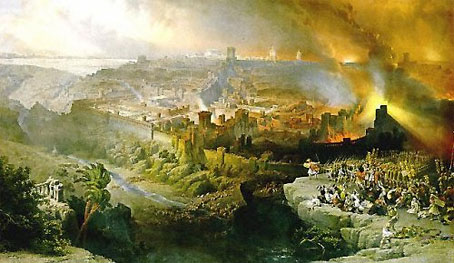
Doug Wilson writes:
“The Levitical administration brought strong curses for disobedience (Heb. 2:2-3); the New Covenant administration brings much greater curses (Heb. 10:29; Heb. 12:25). Christians commonly assume that the really terrifying curses for disobedience were given in the Old Testament, and that under the New Testament all is grace. But this is precisely the opposite of the New Testament’s teaching on the subject” (To a Thousand Generations, pp. 28-29).
This is certainly a side of the New Covenant that Christians are never taught. The first time I ever heard of it was in David Chilton’s Revelation commentary The Days of Vengeance in 1989. But along with baptism (just had to throw that in), a rediscovery of the Old Covenant hammer makes everything in the New Covenant look like a nail. The Revelation is, after all, a book about the end of the Old Covenant.
Continue reading
Comments Off | tags: Baptism, Covenant curse, Covenant Theology, David Chilton, Deuteronomy, Doug Wilson, Hebrews, Josephus, Leviticus, Revelation 20 | posted in Against Hyperpreterism, Biblical Theology, The Last Days
Sep
3
2010
or Insanity and Spiritual Songs
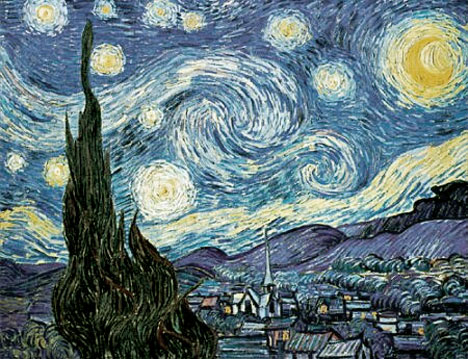
Van Gogh’s work has been regarded by some as “hallucinatory,” however his letters show that few artists were as intelligent and rational. His work was not the product of his dark times but of his struggle against them.
“I am feeling well just now… I am not strictly speaking mad, for my mind is absolutely normal in the intervals, and even more so than before. But during the attacks it is terrible—and then I lose consciousness of everything. But that spurs me on to work and to seriousness, as a miner who is always in danger and makes haste in what he does.” [1]
Continue reading
Comments Off | tags: Covenant Theology, Evolution, Hebrews, Jeremiah, John Piper, Martyrdom, Mission, Noah, Paul, Persecution, Poetry, Psalms, Ray Sutton, Van Gogh, Vindication | posted in Bible Matrix, Biblical Theology, Christian Life, Creation, Quotes
Dec
3
2009
or Weeping over Jerusalem
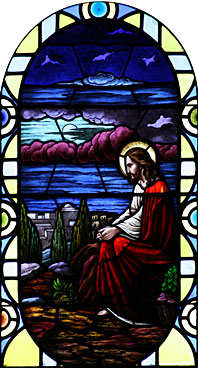 Then Jerusalem, all Judea, and all the region around the Jordan went out to him and were baptized by him in the Jordan, confessing their sins. But when he saw many of the Pharisees and Sadducees coming to his baptism, he said to them, “Brood of vipers! Who warned you to flee from the wrath to come? “Therefore bear fruits worthy of repentance, ”and do not think to say to yourselves, ‘We have Abraham as father.’ For I say to you that God is able to raise up children to Abraham from these stones.” —Matthew 3:5-9
Then Jerusalem, all Judea, and all the region around the Jordan went out to him and were baptized by him in the Jordan, confessing their sins. But when he saw many of the Pharisees and Sadducees coming to his baptism, he said to them, “Brood of vipers! Who warned you to flee from the wrath to come? “Therefore bear fruits worthy of repentance, ”and do not think to say to yourselves, ‘We have Abraham as father.’ For I say to you that God is able to raise up children to Abraham from these stones.” —Matthew 3:5-9
Then, as He was now drawing near the descent of the Mount of Olives, the whole multitude of the disciples began to rejoice and praise God with a loud voice for all the mighty works they had seen, saying: ” ‘Blessed is the King who comes in the name of the LORD!’ Peace in heaven and glory in the highest!” And some of the Pharisees called to Him from the crowd, “Teacher, rebuke Your disciples.” But He answered and said to them, “I tell you that if these should keep silent, the stones would immediately cry out.” —Luke 19:37-40
The Bible is consistent with its symbols, so what is it with stones crying out? Continue reading
Comments Off | tags: Abel, Cain, Elijah, Exodus, Hebrews, John the Baptist, Joshua, Lot, Moses, Resurrection, Toby Sumpter, Uri Brito | posted in Biblical Theology, Quotes, The Last Days
Nov
1
2009
and the Usefulness of the Blood of Abel
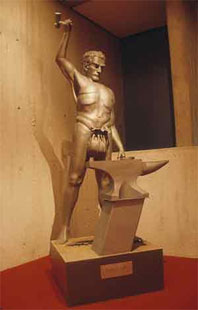 “…you have come… to the blood of sprinkling that speaks [more useful, more serviceable, more advantageous] things than [that of] Abel.” Hebrews 12:22-24
“…you have come… to the blood of sprinkling that speaks [more useful, more serviceable, more advantageous] things than [that of] Abel.” Hebrews 12:22-24
In Biblical Horizons newsletter 203, James Jordan argues that since Cain’s “exodus” to build a city occurred around 130 years after the Fall, he was publicly humiliated before thousands. He would have been accompanied by at least 1000 people, so he didn’t build the city on his own.
This means that Adam, like Solomon, was father to a divided kingdom. 1 Kings presents Solomon as a new Adam, even down to his naming of animals in his biological studies. Cain was like Jeroboam, shown mercy, given a chance, but who then caused Israel to sin.
What does Genesis give us after this? Continue reading
7 comments | tags: Abel, Altar of the Abyss, Athaliah, Cain, Genesis, Hebrews, Herodias, Jeroboam, Solomon, Tabernacle | posted in Biblical Theology, The Last Days
Sep
2
2009
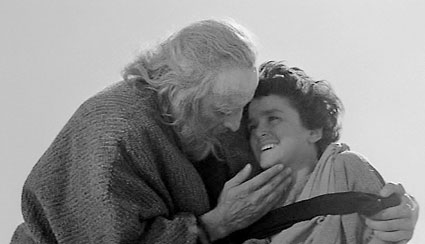
“Look now toward heaven, and count the stars if you are able to number them.” And He said to him, “So shall your descendants be.” And he believed in the LORD, and He accounted it to him for righteousness.
—Genesis 15:5-6
Abraham didn’t sleep in on the day he was to take his beloved son, his only son, to Moriah, kill him and offer him as an ascension. He got up early. By this stage in the narrative, Abraham had been tried and tested many times, but this seems just a little too keen.
Continue reading
Comments Off | tags: Abraham, Covenant Theology, Doug Wilson, Faith, Hebrews, Isaac, Martyrdom, Peter Leithart, Ray Sutton | posted in Christian Life
Aug
14
2009
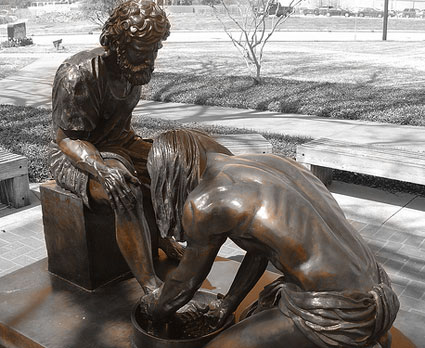
or Filling Up That Which is Lacking
After reading about the Bible’s use of robes as symbols of office (see The Dominion Trap by James B. Jordan), Tim Mitchell commented:
In Bible study we’ve been looking at John, so a few weeks ago was John 13. My Bible translated v.4-5 as “So he got up from the table, took off his robe, wrapped a towel around his waist, and poured water into a basin. Then he began to wash the disciples’ feel, drying them with the towel he had around him.”
So that recalled for me the couple of pages on robe imagery, and it seems to foreshadow what Jesus will do later on very well: He is willing to take off his authority and righteousness, and take on the dirt of our sin.
But then I got a bit unsure, since Jesus then goes on to say “you ought to wash each others’ feet” in v.14 and “Do as I have done to you” in v.15. So if the symbolism applies, how are we also supposed to take other peoples’ sin on us as Jesus did?
Firstly, what a great question. Many New Testament passages become so familiar that we often lose the ability to really think about their ramifications.
The structure of the Last Supper puts this action of Jesus at Atonement, the Laver (Day 6). Jesus is liturgically pre-enacting His role as High Priest. The Adam removed his glorious robes and wore linen for the Day of Covering. Jesus left this in the tomb with our sin on it. But that is not all the High Priest did. He approached the Most Holy twice.
Continue reading
Comments Off | tags: AD70, Against Hyperpreterism, Ahasuerus, Atonement, Daniel, Esther, Hebrews, High Priest, Holy Place, Joseph, Last Supper, Liturgy, Totus Christus | posted in Biblical Theology, Christian Life, Totus Christus
Apr
20
2009
High Chair Fundamentalism
The author of Hebrews wants to press on beyond basic Christian doctrine. He does not want to abandon this foundation, but he does want to build on it. That foundation is repentance from religion, faith in God, the meaning of the Levitical washings or baptisms in the Law, the laying on of hands, the resurrection, and eternal judgment. He is not content with his readers remaining in an infantile state–he intends to press on.
This is important because remaining in the foundational doctrines without pressing on creates the temptation toward apostasy. Those who have been initiated, who have tasted, but who do not press on to know Christ further are in grave danger. Sticking with the basics only is therefore not a good way to stick to the basics.
This is the central problem with pietistic fundamentalism; at the end of the day it is counterproductive and does not defend the things it seeks to defend. The real way to “defend” a foundation is by building on it.
–Doug Wilson, Christ and His Rivals, p. 111
Comments Off | tags: Doug Wilson, Hebrews, Maturity, Teaching | posted in Christian Life, Quotes
Apr
15
2009
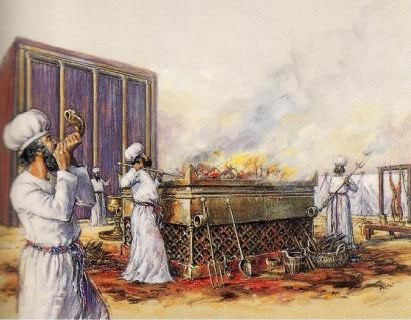
See to it that you do not refuse him who speaks. If they did not escape when they refused him who warned them on earth, how much less will we, if we turn away from him who warns us from heaven? At that time his voice shook the Land, but now he has promised, “Once more I will shake not only the Land but also the heavens.” The words “once more” indicate the removing of what can be shaken—that is, created things—so that what cannot be shaken may remain. Therefore, since we are receiving a kingdom that cannot be shaken, let us be thankful, and so worship God acceptably with reverence and awe, for our “God is a consuming fire.” Hebrews 12:25-29
The context of Hebrews is AD70. The destruction of Jerusalem meant that the saints had received the kingdom (Daniel 7).
Continue reading
Comments Off | tags: AD70, Altar, Atonement, Azal, Hebrews, Jericho, Passover, Tabernacle | posted in Biblical Theology, The Last Days
Apr
10
2009
[This is based on a post by Peter Leithart, Jew – Gentile – Jew ]
In the NT, I believe Hebrews functions as a “Book of Deuteronomy.” After an “exodus” from Jerusalem (as Egypt) and time in the wilderness, the Jewish Christians scattered throughout the empire were facing the destruction of their city (as Jericho). From Hebrews to Jude, the focus of these final New Testament writings shifts from the Gentiles back to the Jews.
Gospels – to the Jew
Acts – first to the Jew, then to the Gentiles: exodus from Jerusalem
Romans to Philemon – to the Gentiles
Hebrews to Jude – to the Jews again
Revelation – destruction of Jerusalem
So there is a Jew (Leviticus), Gentile (wilderness – Numbers), Jew (Deuteronomy) pattern repeated.
The Law is being repeated by Christ as Moses “speaking from heaven” before the crossing of the foetal church into the heavenly country as a new mediatorial government. The writer of Hebrews was warning them not to die in the wilderness as their ancestors did.
Josephus tells us that the Romans beseiged the city when Jews from all over the empire were in Jerusalem for Passover. Their table became a snare.
Comments Off | tags: Hebrews, Josephus, Peter Leithart | posted in Biblical Theology, The Last Days

































